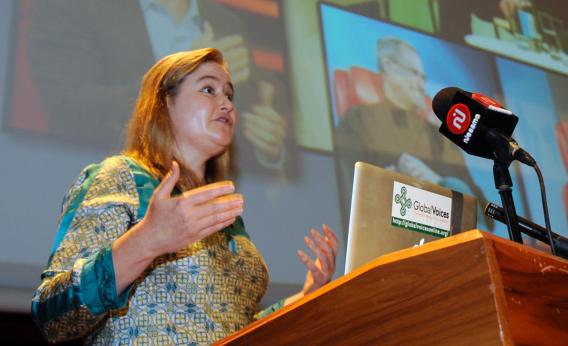New America Foundation fellow (and friend of Future Tense) Rebecca MacKinnon’s new book Consent of the Networked will be published next week. In Consent of the Networked, MacKinnon, who has spent almost a decade researching Internet policy, discusses Internet freedom—and the strange new ways that technology companies serve as sovereign powers. MacKinnon will be discussing her work with New America Foundation President Steve Coll.
To celebrate the launch, Future Tense is holding a book party on Tuesday, Jan. 31, at 6 p.m. in Washington, D.C. We have room for 30 Slate readers to join the festivities. If you would like to come, email us at futuretensedc@gmail.com with your name, email address, and affiliation. If you’d like to bring a guest, please include that information for him or her as well.
We’ll let you know Friday afternoon whether you have received a ticket and where the party will be held.
Want to learn more about Consent of the Networked? The description is below.
Many commentators have debated whether the Internet is ultimately a force for freedom of expression and political liberation, or for alienation, and repression. Rebecca MacKinnon moves the debate about the Internet’s political impact to a new level. It is time, she says, to stop arguing over whether the Internet empowers individuals and societies, and address the more fundamental and urgent question of how technology should be structured and governed to support the rights and liberties of all the world’s Internet users.
Drawing upon two decades of experience as an international journalist, co-founder of the citizen media network Global Voices, Chinese Internet censorship expert, and Internet freedom activist, MacKinnon offers a framework for concerned citizens to understand the complex and often hidden power dynamics amongst governments, corporations, and citizens in cyberspace. She warns that a convergence of unchecked government actions and unaccountable company practices threatens the future of democracy and human rights around the world.
Consent of the Networked is a call to action: Our freedom in the Internet age depends on whether we defend our rights on digital platforms and networks in the same way that people fight for their rights and accountable governance in physical communities and nations. It is time to stop thinking of ourselves as passive “users” of technology and instead act like citizens of the Internet – as netizens – and take ownership and responsibility for our digital future.
